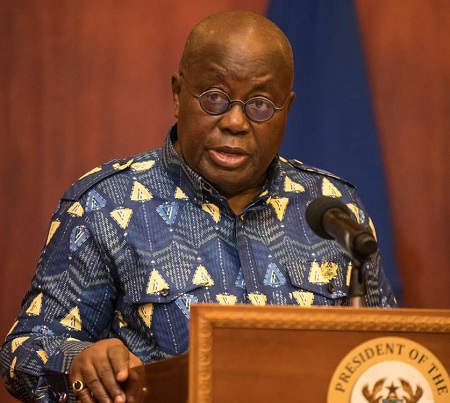The Ministry of Information has announced on Friday July 1, 2022 that President Nana Addo Dankwa Akufo-Addo has instructed the Finance Minister, Ken Ofori-Atta to commence formal engagements with the International Monetary Fund (IMF).
A statement released on Friday said “This follows a telephone conversation between the President and the IMF Managing Director, Mrs. Kritalina Georgieva, conveying Ghana’s decision to engage with the Fund.”
The decision to return to the IMF is to provide balance of payment support as part of broader effort to quicken Ghana’s build back in the face of challenges brought on the country by COVID 19 pandemic and the Russia-Ukraine crisis.
Cabinet is said to have seconded the decision for Ghana to return to IMF in it last meeting.
Any IMF programme will be expected to come up with terms that will ensure fiscal discipline.
The announcement is coming on the heels of former President John Mahama’s suggestion that the government should swallow its pride and run to the IMF for a bailout.
Under the Mahama administration, Ghana turned to the IMF in 2015 for an almost $1billion extended credit-facility programme when the economy hit a downturn.
This was after years of overspending and a collapse in the value of the cedi which caused Ghana’s debt to balloon.
Ghana appears to be facing similar problems, with a total public debt stock of GH¢391.9 billion as of the end of the first quarter of 2022.
This translates to a debt to GDP of 78 percent.
The cedi has also weakened by 22 percent against the dollar this year.
Former President John Dramani proposed to government to take the bull by the horn and return the country to the Fund.
The 2020 presidential candidate of the National Democratic Congress speaking at a forum in Accra on Thursday June 30 stated that the Akufo-Addo administration has no option but to go to the International Monetary Fund (IMF) to resolve the economic challenges.
According to him, the IMF programmes come with fiscal consolidation and insistence on fiscal discipline which can lead to some recovery and improvements on the macro-economic front.
He said that “In the last few days, there has been talk from some regime actors about a potential or impending IMF programme. Due to the nature and depth of our economic problems, this government virtually has no other sustainable option.
“IMF programs come with fiscal consolidation and insistence on fiscal discipline which can lead to some recovery and improvements on the macro-economic front.”
Already, on Monday June 27 by a leading member of the governing New Patriotic Party (NPP), Gabby Otchere-Darko gave the strongest indication that government will be returning to the IMF after he mentioned that in principle, he was not against the IMF programme.
Mr. Otchere-Darko explained that he is not for an IMF programme that gives the country peanuts but imposes conditions that will end up hurting the poor, jobs and businesses more.
In a series of tweets he said “Am I against an IMF program in principle? No”
“I am not for an IMF program that throws peanuts at us but imposes conditions that will end up hurting the poor, jobs and businesses more. Covid-19 and War in Ukraine are not of Africa’s doing but more to our doom. A program that pretends it is all our doing is doomed to fail.”
“We do something that will inject confidence in our capacity to ride this heavy storm and that something should happen pretty quickly. Are you against an IMF program?”
Though, the Finance Minister, Ken Ofori-Atta, has maintained that Ghana would not go back to the IMF for support, it appears such a decision has been swallowed.
The sector minister was optimistic that the government has put in place measures including salary cuts and others, and also programmes to deal with the fundamental issues affecting the economy.
Mr Ofori-Atta said these when he was asked by a foreign journalist whether Ghana would consider going back to the IMF, at a press conference in Accra on Thursday May 12.
He said while answering the question that “All the white folks are just interested in us coming in the IMF programme. I always wonder why.”
“We are members of the fund; there are two major points of interventions that we have from the fund. One being the advise that we get because of the phenomenal expertise that the fund has and then secondly, these programme interventions which bring us some resources.
By Vincent Kubi


